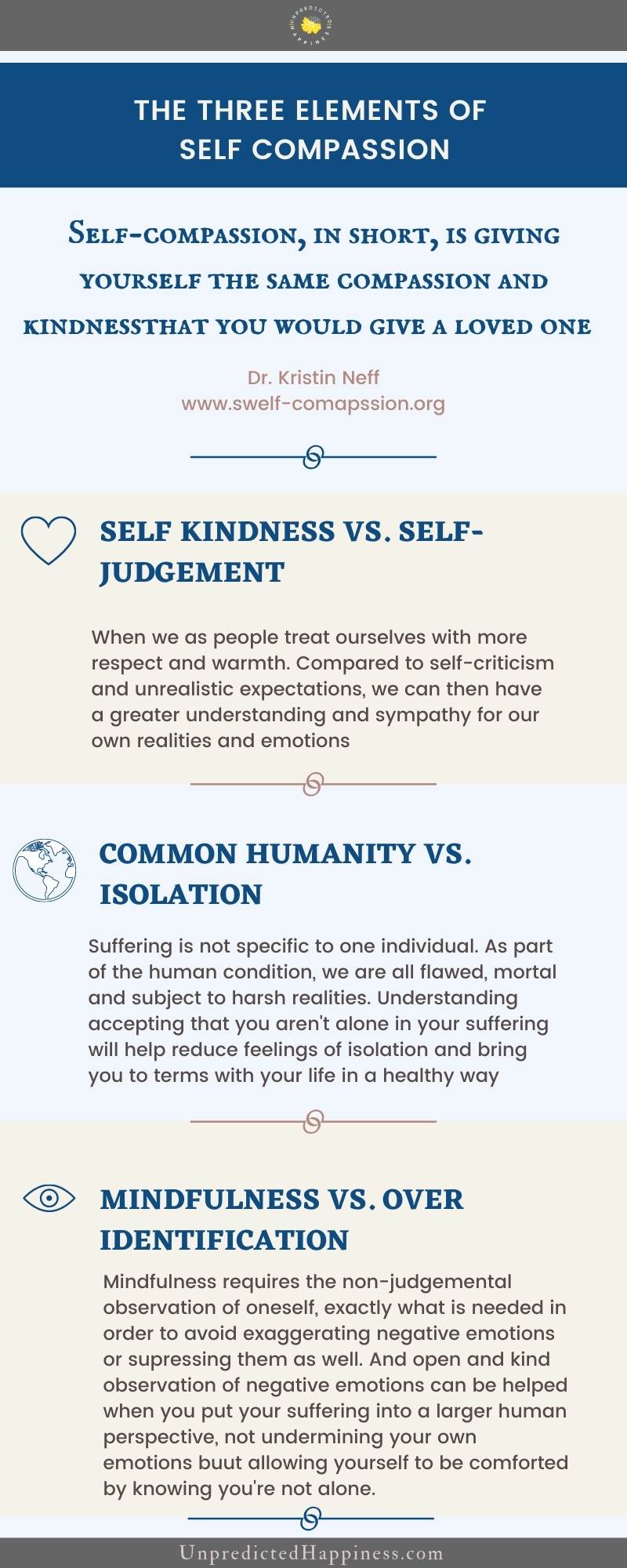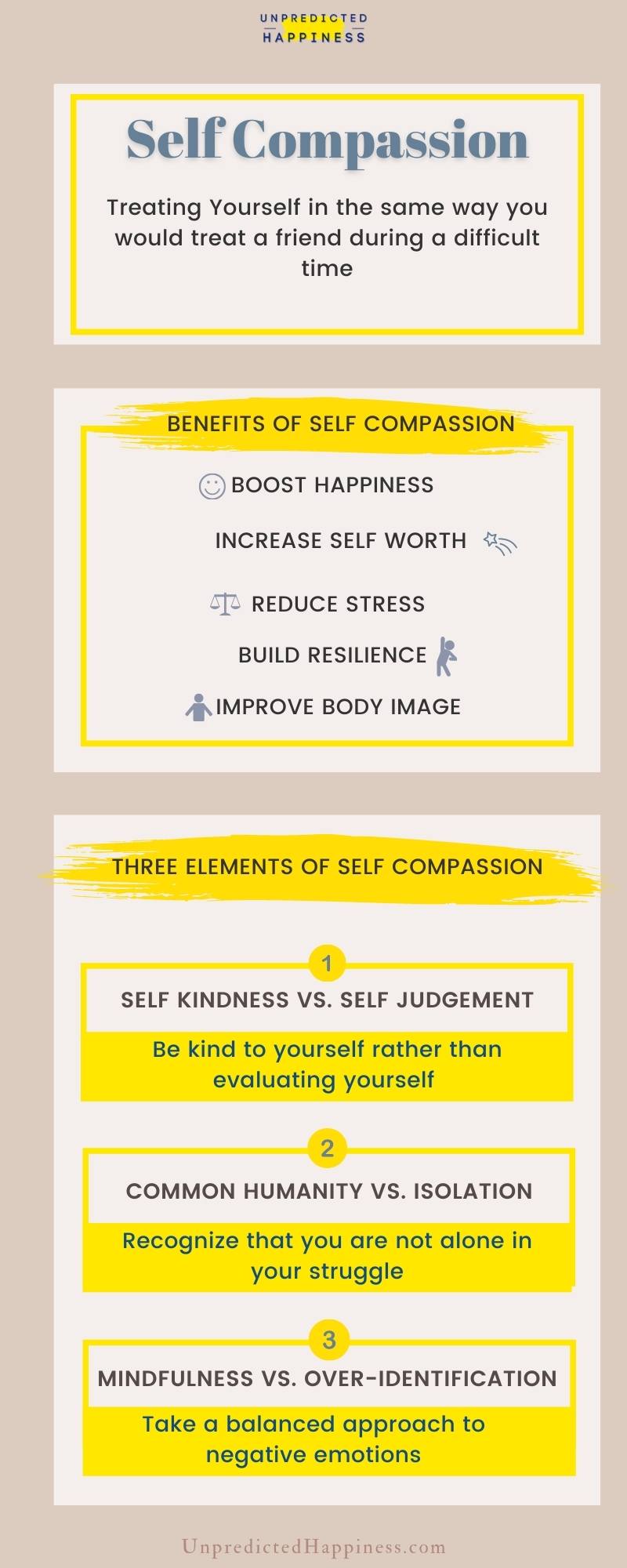Why Being Kind To Yourself Is Key
To Your Happiness
Self Compassion Can Have A Transformative Effect On Your Life
Are you your own worst critic?
Let’s face it, we’ve been practicing self judgement for most of our life and have gotten really good at it. We are most likely harder on ourselves even more than our worst critics. It’s common to beat ourselves up for our “faults” big and small - It’s the ‘norm’ in our society and We’ve come to accept this harsh judgemental inner dialogue and resigned to the suffering impact of our own self doing (and the inner rebel that desires to one day be able to love and accept ourselves just the way we are) The idea that you can actually be kind to yourself, accept your own faults—and enjoy deep emotional benefits as a result is revolutionary to our well trained self-judging brain.
The Effect
Self-criticism, judgement, and beating ourselves up for who we are, our ‘shortcomings’, and ‘imperfections’ comes at a high price. While we might convince ourselves that we are ‘only striving to be better’ with this harsh self-talk, in reality, it does exactly the opposite. It makes us anxious, uneasy, nervous, dissatisfied with our life, having a negative attitude, and can easily take us down the road of feeling hopeless and depressed.
The Way Out
Dr.Kristin Neff, from the University of Texas at Austin who studies self-compassion, strongly suggests that Accepting our imperfections may be the first step toward better well being, satisfaction and happiness in life.
People who are easier on themselves are less likely to be depressed and anxious and are more prone to happiness and optimism. self-compassionate people feel more secure.
“Instead of mercilessly judging and criticizing yourself for various inadequacies or shortcomings, self-compassion means you are kind and understanding when confronted with personal failings – after all, who ever said you were supposed to be perfect?”
By practicing self-compassion we can turn the enemies in our head into friends.
What Is Self-Compassion?
compassion literally means 'to suffer with'. It's our ability to recognize when someone is in emotional pain or having a tough time - and to then offer them warmth, kindness, a listening ear or a helping hand.
Self-compassion simply involves offering that same friendly, warm and understanding attitude to ourselves rather than judging or criticizing ourselves harshly.
Self-compassion steps in precisely when we fall down, allowing us to get up and try again. Can you go easier on yourself?
The Three Elements Of Self Compassion
Self-kindness vs. Self-judgment.
Self-compassion includes being warm and understanding toward yourself when you suffer, fail, or feel inadequate, rather than ignoring your pain or beat yourselves up with self-criticism.
Recognize that being imperfect, failing, and experiencing life difficulties is inevitable.
Be gentle with yourself when confronted with a painful experience.
Common humanity vs. Isolation.
The very definition of being “human” means that you are mortal, vulnerable and imperfect. Therefore, self-compassion involves recognizing that suffering and personal inadequacy is part of the shared human experience – something that we all go through rather than being something that happens to “me” alone.
Frustration at not having things exactly as you want is often accompanied by an irrational and pervasive sense of isolation – as if “I” were the only person suffering or making mistakes. But in reality, all humans suffer.
* Mindfulness vs. Over-identification.
Self-compassion requires taking a balanced approach to your negative emotions so that you neither suppress nor exaggerated your emotions.
Relating your personal experiences to those of others who are also suffering, thus putting your own situation into a larger perspective.
The willingness to observe your negative thoughts and emotions with openness and clarity, so that they are held in mindful awareness.
Self-compassion is not dependent on external circumstances, it's always available, especially when we find ourselves in a difficult or painful situation. We don't have to feel as good as or better than others to feel good about ourselves. Self-compassion allows for personal failings to be acknowledged with kindness and understanding.
Being kind to yourself is not dependent on self-evaluation, comparing ourselves to others (which can lead to self-absorption, a lack of motivation and even depression) but instead comes from an understanding that each person is a human being deserving compassion and understanding, not because they are pretty, clever, multi-talented, intelligent etc.
"People who are compassionate to themselves are much more likely to be happy, resilient, optimistic and motivated to change themselves and their lives for the better. When our inner voice plays the role of a supportive friend (not a continual critic), then when we notice some personal failing, we feel safe and accepted enough to see ourselves clearly and make the changes needed to be healthier and happier"
~ Dr. Kristin Neff
Research shows there the link between being compassionate to others and self-compassion is quite a weak one. Which means we can be compassionate towards others without necessarily being self-compassionate.
But, and more important, is that the more we are kind to ourselves, the longer we can sustain compassion for others. By practicing self-compassion, we "fill up our own tank" with goodness - with warmth, understanding, friendliness and support. And the fuller our own tank is, the happier we are and the more we are able to offer compassion to others over a sustained period of time.
10 Ways you can practice Being Kinder To Yourself
Below are 10 practices from the Mindful Self-Compassion program that could be helpful, along with brief explanations. All these practices can be found in The Mindful Self-Compassion Workbook by Kristin Neff, and guided recordings are available for those practices marked with an asterisk (*).
Self-compassion, like any other change we want to create in our life, is learned slowly. It takes practice, and practice and then more practice.
The priceless gift of self-compassion is learning how to hold our struggles and ourselves in a loving embrace, just as we are and where we are in life, as we take our steps forward into our future.
I'll sign off With this:
Thank you for keeping the flame of compassion burning.
Please, Stay safe, Be kind, Be patient - With yourself and others
And, if you're curious to see how you score in self-compassionate, take the self-compassion questionnaire. from Kristin Neff.
My Overall score is: 4.41, which means I'm moderately self-compassionate.
I have more work to do. 😉
I could beat myself up for not being self-compassionate enough, but these days I am able to catch myself and not go down that downward spiral. Instead, I can see my progress because only a few years ago I would probably have scored much lower!
* Mindfulness is a non-judgmental, receptive mind state in which one observes thoughts and feelings as they are, without trying to suppress or deny them. We cannot ignore our pain and feel compassion for it at the same time. At the same time, mindfulness requires that we not be “over-identified” with thoughts and feelings, so that we are caught up and swept away by negative reactivity.


